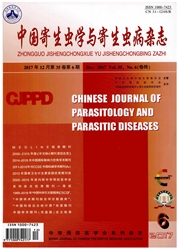

 中文摘要:
中文摘要:
目的探讨旋毛虫Ts21重组蛋白的免疫诊断价值及免疫保护作用。方法应用旋毛虫Ts21重组蛋白ELISA(Ts21-ELISA)与肌幼虫ES抗原ELISA(ES-ELISA)对旋毛虫病与其他寄生虫病患者血清及5种旋毛虫(T1、T2、T3、T4和T7)感染小鼠血清进行检测,并观察不同剂量旋毛虫感染小鼠后不同时间的血清抗体水平。将Ts21重组蛋白皮下注射免疫小鼠(20μg/只,免疫3次,每次间隔10d),末次免疫后10d,每只小鼠用300条旋毛虫肌幼虫经口攻击感染,3.5d和42d后剖杀,观察肠道成虫与肌幼虫数并计算减虫率。结果Ts21-ELISA检测旋毛虫病、并殖吸虫病、囊尾蚴病及棘球蚴病患者血清的抗体阳性率分别为94.7%(18/19)、15.8%(3/19)、9.1%(1/11)和7.7%(1/13),与血吸虫病、华支睾吸虫病患者血清及健康人血清无交叉反应;Ts21重组蛋白与ES抗原ELISA检测旋毛虫病患者血清抗体的敏感性与特异性差异均无统计学意义(χ^20,P〉0.05;χ^20.358,P〉0.05)。Ts21重组蛋白与ES抗原检测T1感染小鼠血清的敏感性差异无统计学意义(χ^20.104,P〉0.05),与T2、T3、T4、T7感染小鼠血清的交叉反应率明显低于ES抗原(χ^217.069,P〈0.05)。小鼠感染300条旋毛虫后4周,应用Ts21-ELISA检测的血清抗体阳性率为100%(10/10);小鼠感染5条旋毛虫后6周,血清抗体阳性率为100%(10/10)。Ts21重组蛋白免疫小鼠用旋毛虫攻击感染后3.5d和42d,肠道成虫与肌幼虫减虫率分别为42.71%和49.8%。结论Ts21重组蛋白可用于旋毛虫病的血清学检测,但不能忽视与并殖吸虫病、囊尾蚴病及棘球蚴病患者血清的交叉反应。
 英文摘要:
英文摘要:
Objective To study the immunodiagnostic value and immune protection of the recombinant Ts21 protein of Trichinella spiralis. Methods ELISA using T. spiralis muscle larval excretory-secretory (ES) antigens (Ts21- ELISA) or recombinant Ts21 protein (Ts21-ELISA) was applied to detect the anti-Trichinella antibodies in sera from patients with trichinellosis and other parasitic infections as well as mice infected with 5 species of Trichinella (T1, T2, T3, T4 and T7). Serum antibody level at different time interval after infection was observed in mice infected with different doses of T1 larvae. Mice were immunized by subcutaneous injection with recombinant Ts21 protein (20 μg/mouse). Ten days after the last immunization, mice were orally infected each with 300 T. spiralis larvae. Mice were sacrificed 3.5 d and 42 d after challenge infection, the intestinal adult worms and muscle larvae were respectively collected and the reduction rate of parasite burden was calculated. Results When Ts21-ELISA was used to assay the serum samples, the antibody positive rate of patients with trichinellosis, paragonimiasis, cysticercosis and echinococcosis was 94.7% (18/19), 15.8% (3/19), 9.1% (1/11) and 7.7% (1/13), respectively; no cross reaction with sera from cases of schistosomiasis, clornochiasis and normal persons was observed. The difference of sensitivity and specificity between recombinant Ts21 protein and ES antigens for detecting the serum antibodies in cases with trichinellosis had no statistical significance (χ^2= 0, P〉0.05; χ^2=0.358, P〉0.05). The sensitivity between recombinant Ts21 protein and ES antigen for testing sera from mice infected T1 showed no significant difference 0(%0.104, P〉0.05), but the cross reaction rate of recombinant Ts21 protein with sera from mice infected with T2, T3, T4 and T7 was considerably lower than that of ES antigens (χ^2=17.069,P〈0.05). In mice infected with 300 T. spiralis larvae, the serum antibody positive rate detected by Ts21-E
 同期刊论文项目
同期刊论文项目
 同项目期刊论文
同项目期刊论文
 期刊信息
期刊信息
